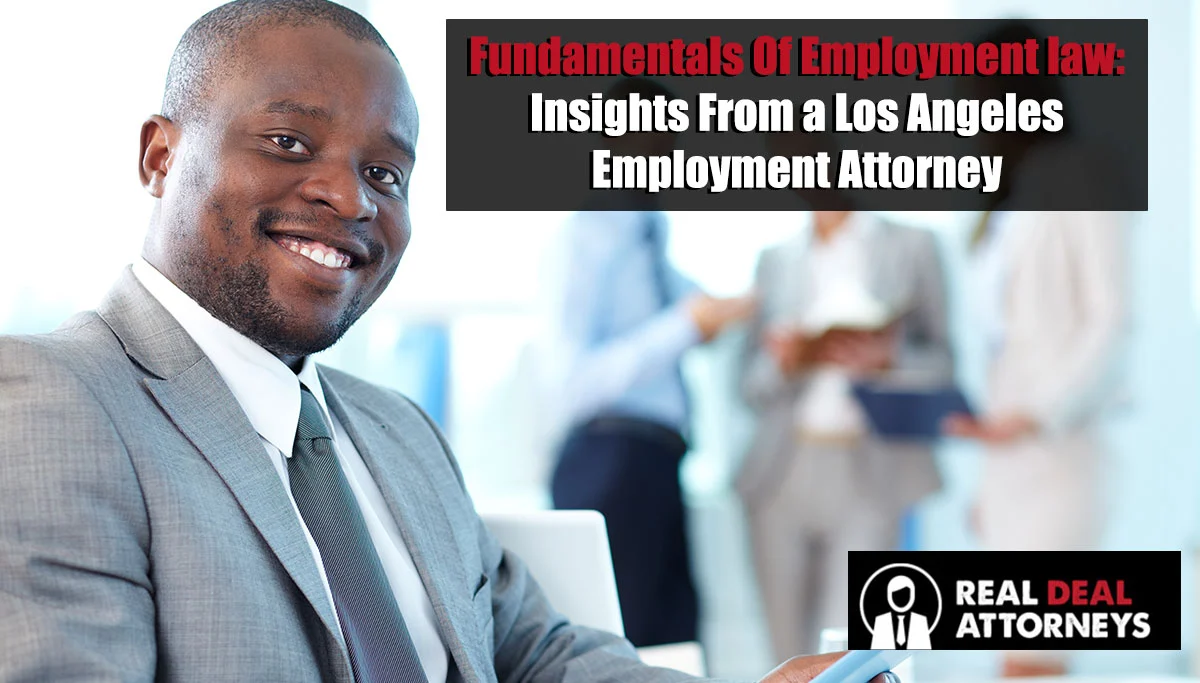Fundamentals Of Employment Law: Insights From A Los Angeles Employment Attorney

There’s no better feeling than landing your first job (or even your second or third). However your career progresses, it’s a fulfilling feeling knowing that you’re employed and working towards your financial goals. The thing is that irrespective of your work ethic, you may be working for an unscrupulous employer. Even if you are working for a wonderful and reliable employer, it is always important to be aware of the fundamentals of employment law in Los Angeles. Understanding employment laws can be extremely overwhelming and you’re honestly not expected to understand them all. However, having a solid understanding of your rights and obligations within your workplace will help you in the long run.
Why Is It Important To Understand Employment Law If I’m Not An Employment Attorney?

While it’s great that there are employment attorneys who can assist and guide you through the litigation process if it ever should come to that ,you don’t want to be in a situation where it’s so far gone that you enlist the services of an employment lawyer almost too late. Understanding the fundamentals of employment law will ensure that you can recognize when things are amiss in the workplace when it happens and not later. An added advantage is that it will empower you to make the necessary decisions to better your workplace for you and your coworkers.
What Are The 10 Most Important California Employment Law Fundamentals I Should Know?

Each state has its own legislation when it comes to employment law, in the state of California the most important rights you will have as an employee include but are not limited to: overtime pay, sick leave, breaks, anti-discrimination rights, protection from sexual harassment, family and medical leave (FMLA), minimum wage, protection against workplace retaliation, workplace safety and protection from wrongful termination.
- Overtime Pay
As mentioned before, exempt and non-exempt employees will have slightly different employment rights. If you are a non-exempt employee, you are entitled to overtime pay if you have worked more than 8 hours a day or 40 hours a week. These hours are meant to be paid at 1.5 times your regular hourly rate. Premium overtime pay (double your hourly rate) should kick in if you work more than 12 hours in a day or if you have more than 8 hours on your 7th consecutive day working. Keep in mind that some employers will try to incorrectly classify non-exempt employees as exempt employees to avoid paying overtime.
- Breaks (For resting and meals)
Non-exempt employees have the right to rest or meal breaks if they are scheduled to work for more than 3.5 hours a day. You are entitled to a 10-minute rest break for every 4 hours that you’re on the clock and the right to a 30-minute lunch or rest break if you work more than 5 hours a day. This break must be taken during the first 5 hours of your shift.
- Protection From Workplace Discrimination
Throughout the state of California, every employee is legally protected from discrimination within the workplace. This means you cannot be discriminated against due to your race, religion, gender, ethnicity, age, national origin, any disabilities you may have, or your sexual orientation. This applies to both state and federal legislation. If you have ever encountered discrimination within the workplace an employment attorney will be able to help you file a claim with the California Civil Rights department (state level) or the Equal Employment Opportunity Commission (Federal level).
- Sick Leave Entitlements
Legally, full-time employees need to have access to at least 24 hours (or 3 working days) of paid sick leave per year. However, many employers do offer more generous sick leave entitlements to employees.
- Family and Medical Leave (FMLA)
Every employee has the right to take a set amount of unpaid leave to care for a sick relative. In California, there is the California Family Rights Act (CFRA) and it applies to employees in both public and private sector enterprises. When it comes to the CFRA it applies to employees who are full-time, part-time, commission-based, or even uncompensated (such as interns). While you are not entitled to paid leave when taking FMLA, your employer must continue providing agreed-upon health benefits & healthcare coverage and ensure that you are given the same or a comparable position should your role be filled during your FMLA.
- Minimum Wage
All employees in the state of California have the right to earn minimum wage. Exempt workers must earn the minimum salary (if not more), which is equivalent to double the state’s minimum wage rate.
- Protection Against Workplace Retaliation
I Regardless of what occurs in the office, you cannot face retaliation for whistleblowing, requesting reasonable accommodations for your religious beliefs or disability (which can include allergies), standing up against harassment and discrimination within the office (or filing a complaint about it) or reporting workplace violations of state or federal law. Retaliation for engaging in any of the above is illegal and a claim can be filed against your workplace on your behalf by an employment attorney.
- Protection from Sexual Harassment
Keep in mind that your gender identity does not matter when it comes to sexual harassment in the workplace. It’s prohibited on both a state and federal level. Sexual harassment can not only create a hostile working environment, but it can lead to an unsavory quid-pro-quo-like situation where you may feel as if you have no choice but to give in to receive job-related benefits such as promotions.
- Working In A Safe Workplace
Every employer must ensure that there are no hazardous conditions within the workplace. This means that regular site inspections should occur to ensure that unsafe situations are corrected, equipment is regularly maintained, and employees have access to paid-for personal protective equipment should they require it. If you deem your workplace to be a danger, your employer cannot threaten to take action against you for refusing to work if the site is unsafe. These violations can be reported to the Occupational Safety and Health Administration (OSHA). A safe working environment also includes workplace privacy. So employees have a reasonable expectation of privacy while at work. This means that employees have the right to maintain privacy around their personal possessions. This is applicable if the items are not accessible to others. Keep in mind that workplace privacy only applies to personal items, company-owned laptops and phones can be monitored by your workplace.
- Protection Against Wrongful Termination
As an employee within California, you have the right to protection against wrongful termination. This means that your employer cannot fire you for certain things. Some of these things include being a whistleblower, reporting unsafe working conditions, using your leave entitlement, or even exercising your rights under the Fair Employment and Housing Act (FEHA). You will be able to take legal action with the help of an employment attorney if you are wrongfully terminated.
You have a wide range of rights as an employee. However exempt employees may not benefit from some Californian employment laws. If you’re uncertain as to your exempt or non-exempt status, you can contact an employment attorney to find out more.
Finding The Right Los Angeles Employment Lawyer

Understanding employment law is crucial to protect your rights as an employee. Make sure you become familiar with key employment law fundamentals. This is to help ensure that you’re working in a legally compliant workplace. If you have any questions or would like to hire an employment attorney – look no further than Real Deal Attorneys Inc. As a California-based lawyer locator service, we will help connect you to a reliable and skilled employment attorney. For more information, give us a call today at (424) 367-1271.
